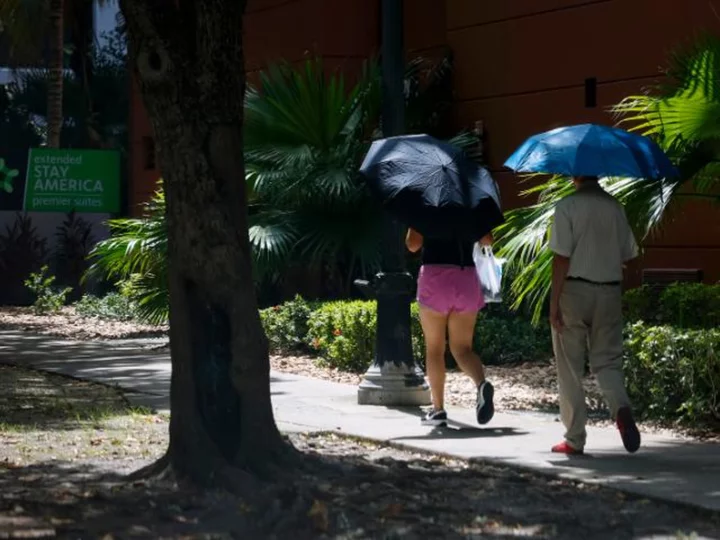Heat is intensifying for millions of people in the Northeast and mid-Atlantic Thursday, creating a "heat health emergency" as nearly half of the country bakes in dangerously high temperatures.
Around 150 million people from coast to coast are under heat alerts Thursday after extreme heat expanded into the highly populated I-95 corridor, bringing the highest temperatures of the year there.
The heat also won't let up in the South and Southwest, where heat-related deaths are climbing, emergency rooms are filling with heat-related burn victims and even animals are falling victim to heat illness.
Live updates: The latest news on heat and extreme weather
Heat indexes -- a measure of what the temperature feels like when accounting for relative humidity -- are expected to top 100 degrees Fahrenheit across many areas in the Midwest, mid-Atlantic and Northeast through Friday.
These kinds of temperatures can be deadly -- heat kills more people in an average year than hurricanes and tornadoes combined -- so both Boston and Philadelphia have declared heat emergencies, opening cooling centers and warning residents to check on the elderly and others most vulnerable to heat illness.
"Let's be clear: heat can kill," New York City Mayor Eric Adams said on Twitter Thursday. "This is dangerous. Take precautions."
New York has also opened cooling centers as nearly 9 million residents across the nation's largest city are under an excessive heat warning through 9 p.m. Friday. Temperatures in the mid-90s combined with high dew points will drive up the heat index and make it feel as hot as 105 degrees. Those temperatures will feel even hotter for millions of New Yorkers in intense urban heat island hot spots.
The temperatures are also testing infrastructure. PJM Interconnection -- the nation's largest power grid system -- has declared an emergency alert. The move activates all systems to be online, including those with planned outages.
PJM coordinates electricity for more than 65 million people in all or parts of Delaware, Illinois, Indiana, Kentucky, Maryland, Michigan, New Jersey, North Carolina, Ohio, Pennsylvania, Tennessee, Virginia, West Virginia and Washington, DC, according to its website.
And high heat has already disrupted work on some major US oil refineries, one of several factors driving higher gas prices.
Here are some other notable places bracing for and dealing with the severe heat:
Washington, DC: The nation's capital is under an excessive heat watch as temperatures are expected to challenge 100 degrees. But they will feel much hotter: Thursday may feel as high as 104 degrees while the "feels like" temperature could reach as high as 107 degrees Friday.
Baltimore: The Charm City in Maryland has activated the season's first Code Red Extreme Heat Alert through Saturday, according to a city news release. The declaration signals the city plans to open several cooling centers as temperatures in the region could feel higher than 100 degrees.
Connecticut: Gov. Ned Lamont activated the state's extreme hot weather protocol, which is in effect through the weekend. Cooling centers across the state will be available, with the governor's office warning that temperatures could feel between 95 to 105 degrees. Lingering impacts are expected to persist during the overnight hours, particularly in urban areas throughout the state, according to a news release.
Missouri: Heat indices across St. Louis and Kansas City will top 100 degrees Thursday and Friday. Temperatures could reach the low 100s in both cities, where excessive heat warnings are in effect.
Minnesota: The Twin Cities are under an excessive heat warning Thursday, when heat indices are expected to hit 105 degrees. "Little cooling relief is expected tonight as temperatures remain in the 70s overnight," the NWS in the Twin Cities said.
Indiana: The capital city of Indianapolis will see temperatures as high as 100 degrees by Friday. The heat index could be as high as 109 degrees Friday.Phoenix: The epicenter of the persistent heat wave is forecast to top 110 degrees again Thursday, which would be the 28th consecutive day with a high temperature exceeding 110 degrees. Some relief back to "normal" temperatures below 110 degrees is forecast by Sunday into next week. Texas: Triple-digit highs are expected across the state including in Dallas, San Antonio, Amarillo and El Paso, where temperatures have topped 100 degrees for a record-breaking 41 consecutive days.
Possible severe storms threaten Northeast megalopolis
The Northeast, mid-Atlantic and upper Midwest face an additional weather threat Thursday: strong-to-severe storms that could disrupt travel and knock out power amid the sweltering heat.
Brief and isolate tornadoes can't be ruled out, but the Level 2 out of 5 threat is primarily for damaging winds that could affect the entire I-95 corridor from Washington, DC, to Boston. The storms should fire up in the early afternoon into the evening and could affect the afternoon rush hour commute, so also look out for flooding on roadways.
Parts of northern Wisconsin and eastern Minnesota, including Duluth, Minnesota, are under a Level 3 out of 5 threat Thursday for damaging storms that could produce wind gusts as high as 75 mph along with large hail. The Twin Cities faces a Level 2 out of 5 threat, also for strong winds and hail. Wind gusts that strong could easily down power lines and make for a miserably hot powerless evening.









